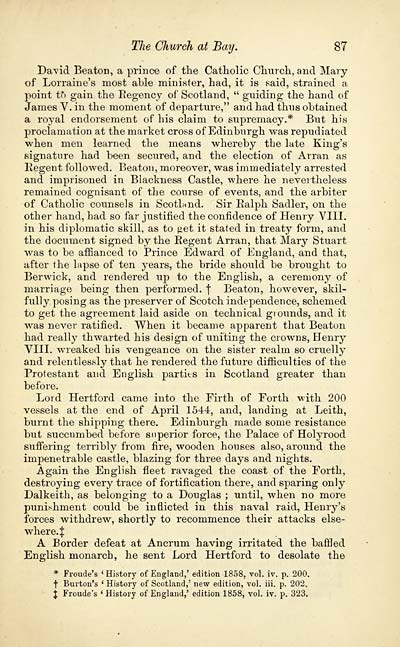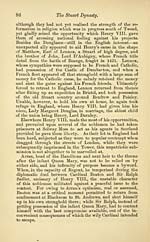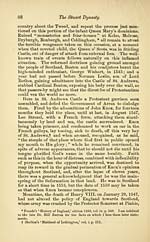Stuart dynasty
(107) Page 87
Download files
Complete book:
Individual page:
Thumbnail gallery: Grid view | List view

The Church at Bay. 87
David Beaton, a prince of the Catholic Church, and Mary
of Lorraine's most able minister, had, it is said, strained a
point tO gain the Regency of Scotland, " guiding the hand of
James V. in the moment of departure," and had thus obtained
a royal endorsement of his claim to supremacy.* But his
proclamation at the market cross of Edinburgh was repudiated
when men learned the means whereby the late King's
signature had been secured, and the election of Arran as
Regent followed. Beaton, moreover, was immediately arrested
and imprisoned in Blackness Castle, where he nevertheless
remained cognisant of the course of events, and the arbiter
of Catholic counsels in Scotland. Sir Ralph Sadler, on the
other hand, bad so far justified the confidence of Henry VIII.
in his diplomatic skill, as to get it stated in treaty form, and
the document signed by the Regent Arran, that Mary Stuart
was to be affianced to Prince Edward of England, and that,
after the lapse of ten years, the bride should be brought to
Berwick, and rendered up to the English, a ceremony of
marriage being then performed, f Beaton, however, skil-
fully posing as the preserver of Scotch independence, schemed
to get the agreement laid aside on technical giounds, and it
was never ratified. When it became apparent that Beaton
had really thwarted his design of uniting the crowns, Henry
VIII. wreaked his vengeance on the sister realm so cruelly
and relentlessly that he rendered the future difficulties of the
Protestant and English parties in Scotland greater than
before.
Lord Hertford came into the Firth of Forth with 200
vessels at the end of April 1544, and, landing at Leith,
burnt the shipping there. Edinburgh made some resistance
but succumbed before superior force, the Palace of Holyrood
suffering terribly from fire, wooden houses also, around the
impenetrable castle, blazing for three days and nights.
Again the English fleet ravaged the coast of the Forth,
destroying every trace of fortification there, and sparing only
Dalkeith, as belonging to a Douglas ; until, when no more
punishment could be inflicted in this naval raid, Henry's
forces withdrew, shortly to recommence their attacks else-
where. |
A Border defeat at Ancrum having irritated the baffled
English monarch, he sent Lord Hertford to desolate the
* Froude's ' History of England,' edition 1858, vol. iv. p. 200.
f Burton's ' History of Scotland,' new edition, vol. iii. p. 202..
J Froude's * History of England,' edition 1858, vol. iv. p. 323.
David Beaton, a prince of the Catholic Church, and Mary
of Lorraine's most able minister, had, it is said, strained a
point tO gain the Regency of Scotland, " guiding the hand of
James V. in the moment of departure," and had thus obtained
a royal endorsement of his claim to supremacy.* But his
proclamation at the market cross of Edinburgh was repudiated
when men learned the means whereby the late King's
signature had been secured, and the election of Arran as
Regent followed. Beaton, moreover, was immediately arrested
and imprisoned in Blackness Castle, where he nevertheless
remained cognisant of the course of events, and the arbiter
of Catholic counsels in Scotland. Sir Ralph Sadler, on the
other hand, bad so far justified the confidence of Henry VIII.
in his diplomatic skill, as to get it stated in treaty form, and
the document signed by the Regent Arran, that Mary Stuart
was to be affianced to Prince Edward of England, and that,
after the lapse of ten years, the bride should be brought to
Berwick, and rendered up to the English, a ceremony of
marriage being then performed, f Beaton, however, skil-
fully posing as the preserver of Scotch independence, schemed
to get the agreement laid aside on technical giounds, and it
was never ratified. When it became apparent that Beaton
had really thwarted his design of uniting the crowns, Henry
VIII. wreaked his vengeance on the sister realm so cruelly
and relentlessly that he rendered the future difficulties of the
Protestant and English parties in Scotland greater than
before.
Lord Hertford came into the Firth of Forth with 200
vessels at the end of April 1544, and, landing at Leith,
burnt the shipping there. Edinburgh made some resistance
but succumbed before superior force, the Palace of Holyrood
suffering terribly from fire, wooden houses also, around the
impenetrable castle, blazing for three days and nights.
Again the English fleet ravaged the coast of the Forth,
destroying every trace of fortification there, and sparing only
Dalkeith, as belonging to a Douglas ; until, when no more
punishment could be inflicted in this naval raid, Henry's
forces withdrew, shortly to recommence their attacks else-
where. |
A Border defeat at Ancrum having irritated the baffled
English monarch, he sent Lord Hertford to desolate the
* Froude's ' History of England,' edition 1858, vol. iv. p. 200.
f Burton's ' History of Scotland,' new edition, vol. iii. p. 202..
J Froude's * History of England,' edition 1858, vol. iv. p. 323.
Set display mode to:
![]() Universal Viewer |
Universal Viewer | ![]() Mirador |
Large image | Transcription
Mirador |
Large image | Transcription
Images and transcriptions on this page, including medium image downloads, may be used under the Creative Commons Attribution 4.0 International Licence unless otherwise stated. ![]()
| Histories of Scottish families > Stuart dynasty > (107) Page 87 |
|---|
| Permanent URL | https://digital.nls.uk/94819050 |
|---|
| Description | A selection of almost 400 printed items relating to the history of Scottish families, mostly dating from the 19th and early 20th centuries. Includes memoirs, genealogies and clan histories, with a few produced by emigrant families. The earliest family history goes back to AD 916. |
|---|

